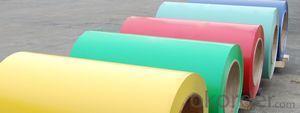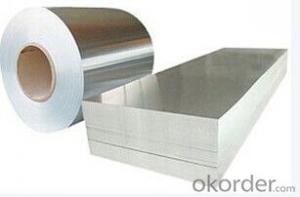AA 1070 aluminium coil
- Loading Port:
- China Main Port
- Payment Terms:
- TT OR LC
- Min Order Qty:
- -
- Supply Capability:
- -
OKorder Service Pledge
Quality Product, Order Online Tracking, Timely Delivery
OKorder Financial Service
Credit Rating, Credit Services, Credit Purchasing
You Might Also Like
supply Mill-finished / coated aluminum plate/sheet/ coil:
Alloy: AA1050,1060,1100,1200,2024,3003,3304,3005,3015,5052,5086,5754,5083,6061,7050,7475,8011, etc
Temper: O, H14/16/18/22/24/32/ H112/H321/T6,T851,T7451,T7351, etc
Thickness: 0.02mm—20mm
Width: 100mm—2000mm (Can be slitted)
Notice: PE coating / PVDF coating / Embossment can be done if required.
- Q:If so why does an aluminum bend or get nicked or break quickly?
- It depends on how you set the criteria of comparison. If you go by volume, Aluminum isn't stronger. That's why a steel can is stronger than one of similar size and thickness. If you go by weight, aluminum is said to be stronger. Let's say we were looking to create a wall, spec'ed to a particular height and width, and just thick enough to hold back a given PSI of pressure. The aluminum one would have to be thicker to have the strength to hold back the pressure, but it'd be lighter than the steel equivalent. Also, the ease by which a material can be nicked isn't an indicator of strength but of hardness. Harder, isn't necessarily stronger.
- Q:How are aluminum coils protected against bending and warping during storage?
- Aluminum coils are protected against bending and warping during storage through various measures and precautions. Firstly, the coils are typically stored in a horizontal position to evenly distribute the weight and minimize stress on the coil. This helps to prevent any bending or warping that could occur if the coils were stored vertically. Additionally, the coils are often wrapped in protective materials such as plastic or paper to provide a barrier against external forces that could cause damage. These protective wrappings help to cushion the coils and prevent any direct contact with hard surfaces that could result in bending or warping. Furthermore, it is common practice to stack the coils carefully and securely, ensuring that they are not overloaded or subjected to excessive pressure. This is done to maintain the structural integrity of the coils and prevent any deformation during storage. Temperature control is another important aspect in protecting aluminum coils against bending and warping. Extreme temperature fluctuations can cause the metal to expand or contract, potentially leading to warping. Therefore, the storage environment should be maintained at a stable temperature to minimize any thermal stress on the coils. Overall, a combination of proper handling, protective wrappings, secure stacking, and temperature control play crucial roles in preventing bending and warping of aluminum coils during storage. These measures ensure that the coils remain in optimal condition and are ready for use when needed.
- Q:Can aluminum coils be used for food storage and processing?
- Food storage and processing can indeed utilize aluminum coils. The multitude of advantageous properties that aluminum possesses is what makes it a popular choice in this field. Its lightweight nature, strength, and resistance to corrosion create an ideal environment for maintaining the quality and freshness of food. Aluminum coils are versatile and can be used to manufacture a wide range of equipment like containers, pans, trays, and foil for food storage and processing. Additionally, the excellent thermal conductivity of aluminum enables efficient cooling and heating of food. Its impermeability to light, moisture, and oxygen is also beneficial in preventing spoilage and contamination. In conclusion, aluminum coils offer a reliable and secure option for food storage and processing needs.
- Q:What are the different forming processes for aluminum coils?
- There are several different forming processes that are commonly used for aluminum coils. These processes include: 1. Hot rolling: This is the most common method used to form aluminum coils. It involves heating the aluminum to a high temperature and then rolling it between two large rolls to reduce its thickness. This process allows for precise control of the thickness and shape of the coil. 2. Cold rolling: This process is similar to hot rolling, but the aluminum is cooled to room temperature before it is rolled. Cold rolling is often used to produce coils with a smoother surface finish and tighter tolerances. 3. Continuous casting: In this process, molten aluminum is poured into a continuous casting machine, which produces a continuous strip of aluminum. The strip is then cooled and coiled to form aluminum coils. Continuous casting is often used for large-scale production of aluminum coils. 4. Extrusion: This process involves pushing aluminum through a die to create a specific shape or profile. The extruded aluminum is then cooled and coiled to form aluminum coils. Extrusion is commonly used to produce coils with complex shapes or profiles. 5. Slitting: Slitting is a process used to cut aluminum coils into narrower strips. It involves passing the coil through a set of rotating blades that cut the coil into multiple smaller strips. Slitting is often used to produce coils with specific widths or for further processing. These are just a few of the different forming processes that can be used to produce aluminum coils. The choice of process depends on factors such as the desired shape, thickness, and surface finish of the coil, as well as the production volume and cost considerations.
- Q:The export aluminum volume is CIF. If there is no insurance policy, how will the customs premium be collected?
- The customs will not charge your premium the premium you can write but if you are a refund if there will be some impact because of the tax rebate minus the freight and insurance premium so you consider the premium but you can write less Never mind if you need shipping or shipping insurance declaration business can contact me oh
- Q:How do aluminum coils contribute to the aesthetics of architectural designs?
- Aluminum coils play a significant role in enhancing the aesthetics of architectural designs. One of the main reasons is their versatility in terms of shape and size. Aluminum coils can be easily formed into various shapes, making them suitable for a wide range of architectural applications. The lightweight nature of aluminum coils also contributes to their aesthetic appeal. They provide a sleek and modern look to buildings, especially when used in cladding or façade systems. The use of aluminum coils can create a visually pleasing and contemporary appearance, adding a touch of elegance to the overall design. Additionally, aluminum coils offer a wide range of color options, thanks to their ability to be coated or painted. This allows architects and designers to choose from an extensive palette of colors, enabling them to match the building's exterior with its surroundings or to create a specific mood or theme. The color choices available for aluminum coils provide endless possibilities for customization and creativity in architectural design. Furthermore, aluminum coils are highly durable and resistant to corrosion, making them suitable for long-lasting architectural applications. Their ability to withstand harsh weather conditions ensures that the building's aesthetics remain intact over time. This durability factor is essential in maintaining the visual appeal of architectural designs, as it prevents the need for frequent repairs or replacements. In summary, aluminum coils contribute to the aesthetics of architectural designs through their versatility, lightweight nature, color options, and durability. Their ability to be shaped into various forms, combined with a wide range of color choices, allows architects and designers to create visually stunning and customized buildings. The sleek and modern appearance of aluminum coils adds a touch of elegance to architectural designs, enhancing their overall aesthetics.
- Q:Two days ago, my cocker spaniel ate most of a small aluminum bread pan--the disposable kind you can buy in the supermarket. The pieces I picked up when I discovered what he'd done were sharp, so I called the vet (right before closing), who recommended just keeping an eye on him for nausea, diarrhea, etc. The next morning I brought the dog and he showed no discomfort, but the vet put him on an antibiotic (esp. for gastric problems) just in case. It's been 48 hours, and the dog's still happy and eating and drinking, and when we go for a walk, his poo is fine (yep; I examine it!) ... if he's passed the aluminum, it must have been in the back yard when he was out on his own, and not on a walk. However, I'm still very anxious. At what point can I draw a sigh of relief? Thank you!
- Aluminum will pass just like food. It will empty from the stomach and go through the digestive tract. Hopefully he chewed up the pieces so that they are small and are at no risk of cutting his intestines or bowels. But if he is not yet showing discomfort, all should be well. You made the smart choice and called the vet, and if they do not seem too worried you shouldn't be either unless your pooch begins acting differently or seems to be in discomfort.
- Q:What are the differences between aluminum coil 3003h24 and 3a21h14?
- The mechanical property references of rolled plate 3003 H24and 3A21 H14 are as follows: 3003 H24--Rm/MPa≧140-180;Rp0.2/MPa≧115;A(%)≧1-5(thickness 0.2mm-4.5mm)3A12 H14--Rm/MPa≧145-215;A(%)≧6
- Q:Anybody out there doing personalized pendants ? I wanted to try the sterling silver but it's so expensive...and now I am thinking about aluminium...any help? i am new to this and just purchased a set of metal stamps .
- Aluminum okorder and check their prices on sterling silver sheet. I think it's the best place online, with excellent service and really super-reasonable prices. I buy all my wire and metals there.
- Q:What is an aluminum coil and what is it used for?
- An aluminum coil is a long, thin, and flat strip of aluminum that is typically rolled up. It is used in various industries, including construction, automotive, and electrical, due to its excellent properties such as lightweight, corrosion resistance, and conductivity. Aluminum coils are commonly used for manufacturing various products like roofing, gutters, cans, heat exchangers, and electrical wiring, among others.
1. Manufacturer Overview |
|
|---|---|
| Location | |
| Year Established | |
| Annual Output Value | |
| Main Markets | |
| Company Certifications | |
2. Manufacturer Certificates |
|
|---|---|
| a) Certification Name | |
| Range | |
| Reference | |
| Validity Period | |
3. Manufacturer Capability |
|
|---|---|
| a)Trade Capacity | |
| Nearest Port | |
| Export Percentage | |
| No.of Employees in Trade Department | |
| Language Spoken: | |
| b)Factory Information | |
| Factory Size: | |
| No. of Production Lines | |
| Contract Manufacturing | |
| Product Price Range | |
Send your message to us
AA 1070 aluminium coil
- Loading Port:
- China Main Port
- Payment Terms:
- TT OR LC
- Min Order Qty:
- -
- Supply Capability:
- -
OKorder Service Pledge
Quality Product, Order Online Tracking, Timely Delivery
OKorder Financial Service
Credit Rating, Credit Services, Credit Purchasing
Similar products
New products
Hot products
Related keywords































